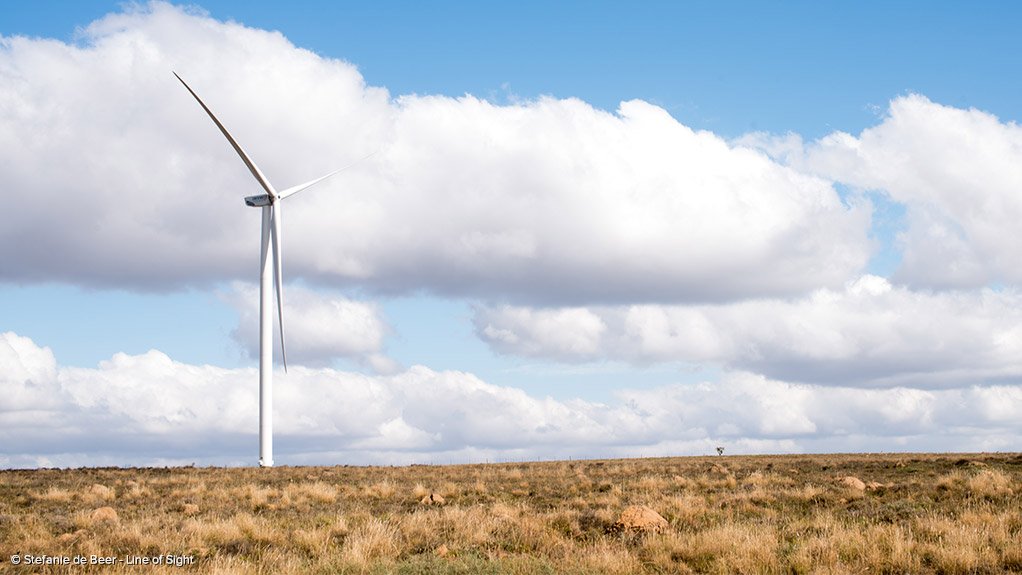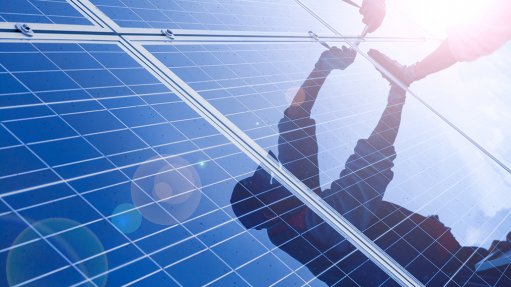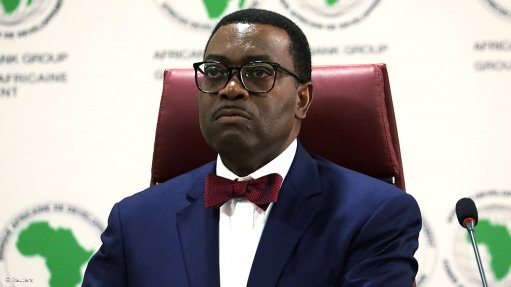Infrastructure at core of business’ R3.4-trillion economic recovery proposal


B4SA paper says green-economy investments should be accelerated as part of infrastructure-led recovery
Business for South Africa (B4SA) released an economic recovery strategy paper on July 10 that includes a list of 12 priority initiatives, many infrastructure-related, which the formation argues could bolster gross domestic product (GDP) by R1-trillion, create up to 1.5-million jobs and increase yearly tax revenues by R100-billion in the coming three years.
It also called for the establishment of a Joint Reconstruction Task Team to coordinate the implementation of the recovery plan, which would require public and private funding of R3.4-trillion over the coming three years.
The paper follows hot on the heels of the recent Sustainable Infrastructure Development Symposium South Africa at which President Cyril Ramaphosa argued that infrastructure should be the “flywheel” of the country’s economic recovery from Covid-19.
It also coincides with the release of a discussion document published by the African National Congress’ economic transformation committee, which asserts that mobilising society around an infrastructure-led recovery should be the “first pillar of a new policy framework” introduced to address the economic damage associated with the pandemic.
B4SA, which was established in response to Covid-19, said its paper had the support of a number of business associations, including the Association for Savings and Investments South Africa, the Black Business Council (BBC), the Banking Association of South Africa, Business Unity South Africa (Busa), Business Leadership South Africa and Minerals Council South Africa.
In fact, Busa president Sipho Pityana described the paper as the first-ever “unambiguously united response” by organised business to any issue, while BBC president Sandile Zungu labelled the intervention a demonstration of business’ commitment to being a reliable social partner.
Titled ‘A New Inclusive Economic Future for South Africa: Delivering an Accelerated Economic Recovery Strategy’, the document includes 12 initiatives, each comprising several specific projects, that mostly overlap with the 18 Strategic Integrated Projects that the Presidential Infrastructure Coordinating Committee has been prioritising in recent years.
Pityana acknowledged that the proposals contained in the document were not new.
He stressed, however, that the projects and reforms outlined remained fundamental to placing South Africa on a new growth trajectory and noted that they had also not yet been implemented as envisaged.
For instance, B4SA said that projects and initiatives to ensure affordable and secure electricity supply should be prioritised along with efforts to fast-track green-economy investments through an acceleration of the deployment of renewable energy and the launch of a “green stimulus and national green funding strategy”.
It also wanted Eskom’s operating and capital structures to be addressed and the Integrated Resource Plan 2019 (IRP 2019) updated to include revised gas-to-power targets. The IRP 2019 currently allocates 3 000 MW to gas until 2030.
The other ten projects and initiatives identified, included:
- implementing Transnet’s road-to-rail strategy, through addressing rail bottlenecks, expanding the Saldanha corridor and concessioning the Lephalale-Maputo line;
- expanding and improving the competitiveness of the country’s ports, including by increasing their capacity to handle mining and agricultural products;
- investing in road infrastructure, including completing the implementation of the bus-rapid transit projects;
- ensuring full spectrum utilisation through the issuance of licences and pursuing a rapid deployment plan;
- pursuing e-learning and digital health platforms;
- accelerating e-commerce, including by migrating government and small firms to digital platforms;
- implementing delayed water infrastructure projects and improving coordination in the sector;
- maximising commercial agricultural output and also pursuing cannabis industrialisation prospects;
- prioritising import replacement in high-value sectors while developing regional trading corridors; and
- increasing financial inclusion and lowering the cost of capital.
“A recurring conclusion across most sectors is that infrastructure is a key enabler which must be addressed with urgency if businesses are to deliver inclusive growth,” B4SA argued, adding that a constructive and effective policy framework was also required to support and sustain growth.
B4SA’s Martin Kingston said the funding required to implement the plan would be split between the public sector (R2.4-trillion) and the private sector (R1-trillion) and could only be raised if South Africa presented a coherent and compelling case to domestic and international investors.
“Given the structure and size of South Africa’s financial markets, this level of funding need cannot be met by domestic sources, nor is it possible for the South African Reserve Bank to address the shortfall in a responsible and sustainable manner through monetary measures. Increased foreign capital will therefore be required, which South Africa will have to compete for,” Kingston said.
FORK IN THE ROAD
Key constraints to accessing the estimated $12-trillion in pandemic-related support available globally was South Africa’s weak growth, its worsening fiscal position and recent downgrades by the credit rating agencies.
B4SA warned that the Covid-19 pandemic was likely to result in South Africa’s GDP declining by between 8% and 10% in 2020, as well as a sharp increase in the 2020/21 fiscal deficit to about 13.3%.
“In the absence of growth-enhancing structural reforms, budget deficits are expected to remain high and government debt is expected to exceed 100% of GDP in 2023 (versus 26% in 2008), as annual Budget deficits remain above 13% of GDP.”
The paper urges government to pursue a “zero-based reconstruction Budget” and for Finance Minister Tito Mboweni to provide visibility of such a budgetary response when presenting his Medium-Term Budget Policy Statement in October.
The Covid-19 economic shock, B4SA asserts, presents an opportunity to reimagine South Africa’s future, and has placed South Africa at a “fork in the road” and actions taken in response to the crisis will determine whether the country follows a “low road or a high road”.
Should it take the low road, the gains made since 1994 would be lost, while the high road to reposition the economy to grow at a yearly rate of about 5% would help reduce unemployment, inequality and poverty.
“The immediate imperative is to kick-start inclusive economic growth by restoring confidence, attracting investment, and implementing projects which will lead to near-term employment gains, and which then support inclusive growth over the medium and long-term,” the paper asserts.
Comments
Announcements
What's On
Subscribe to improve your user experience...
Option 1 (equivalent of R125 a month):
Receive a weekly copy of Creamer Media's Engineering News & Mining Weekly magazine
(print copy for those in South Africa and e-magazine for those outside of South Africa)
Receive daily email newsletters
Access to full search results
Access archive of magazine back copies
Access to Projects in Progress
Access to ONE Research Report of your choice in PDF format
Option 2 (equivalent of R375 a month):
All benefits from Option 1
PLUS
Access to Creamer Media's Research Channel Africa for ALL Research Reports, in PDF format, on various industrial and mining sectors
including Electricity; Water; Energy Transition; Hydrogen; Roads, Rail and Ports; Coal; Gold; Platinum; Battery Metals; etc.
Already a subscriber?
Forgotten your password?
Receive weekly copy of Creamer Media's Engineering News & Mining Weekly magazine (print copy for those in South Africa and e-magazine for those outside of South Africa)
➕
Recieve daily email newsletters
➕
Access to full search results
➕
Access archive of magazine back copies
➕
Access to Projects in Progress
➕
Access to ONE Research Report of your choice in PDF format
RESEARCH CHANNEL AFRICA
R4500 (equivalent of R375 a month)
SUBSCRIBEAll benefits from Option 1
➕
Access to Creamer Media's Research Channel Africa for ALL Research Reports on various industrial and mining sectors, in PDF format, including on:
Electricity
➕
Water
➕
Energy Transition
➕
Hydrogen
➕
Roads, Rail and Ports
➕
Coal
➕
Gold
➕
Platinum
➕
Battery Metals
➕
etc.
Receive all benefits from Option 1 or Option 2 delivered to numerous people at your company
➕
Multiple User names and Passwords for simultaneous log-ins
➕
Intranet integration access to all in your organisation



















